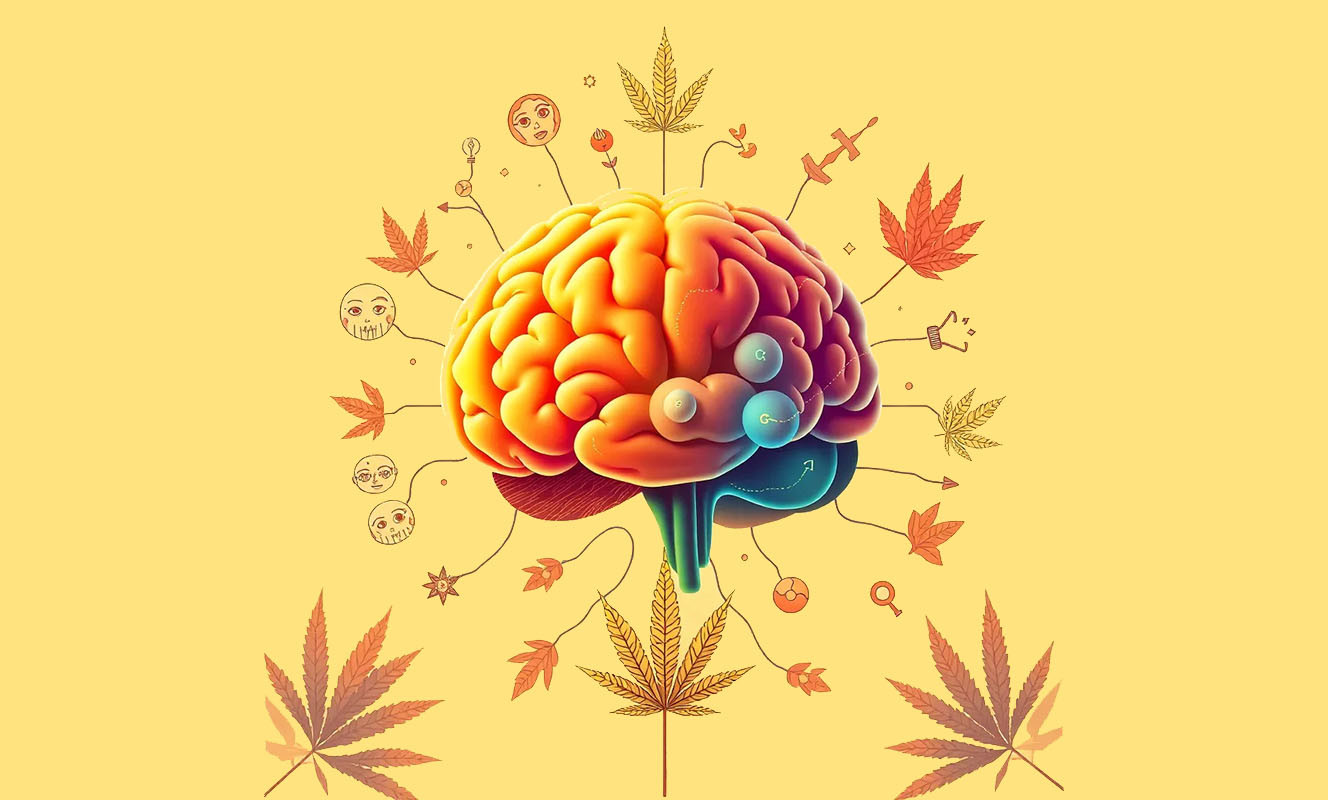In recent years, the conversation surrounding mental health has evolved significantly, with increasing recognition of the complex interplay between biological, psychological, and social factors. Among the biological factors, the endocannabinoid system (ECS) has emerged as a promising area of research, particularly regarding its influence on mental health conditions such as anxiety, depression, and post-traumatic stress disorder (PTSD). This blog post will delve into the relationship between the ECS and mental health, exploring how cannabinoids can affect mood and emotional regulation, and summarizing current research on their therapeutic potential.
Understanding the Endocannabinoid System
Before diving into the specifics of mental health, it's essential to understand the ECS and its components. The ECS is a complex cell-signaling system that plays a crucial role in maintaining homeostasis in the body. It consists of three primary components:
- Endocannabinoids: These are naturally occurring compounds produced by the body, with the two most studied being anandamide (AEA) and 2-arachidonoylglycerol (2-AG). They are synthesized on-demand and act as neurotransmitters, binding to cannabinoid receptors to regulate various physiological processes.
- Cannabinoid Receptors: The ECS comprises two primary types of receptors: CB1 and CB2. CB1 receptors are primarily located in the brain and central nervous system, while CB2 receptors are predominantly found in the peripheral nervous system and immune cells. The distribution of these receptors suggests that the ECS plays a significant role in both neurological and immune responses.
- Metabolic Enzymes: These enzymes are responsible for the synthesis and degradation of endocannabinoids, ensuring that their levels are appropriately regulated in response to the body’s needs.
The ECS is involved in numerous physiological processes, including mood regulation, stress response, appetite, and pain perception. Its role in mental health is particularly intriguing, as imbalances in the ECS have been linked to various psychiatric disorders.
The Endocannabinoid System and Mental Health
Anxiety Disorders
Anxiety disorders are among the most common mental health conditions, affecting millions of people worldwide. These disorders can manifest as generalized anxiety disorder (GAD), social anxiety disorder, panic disorder, and specific phobias. Research suggests that the ECS may play a crucial role in modulating anxiety responses.
- Anandamide and Anxiety: Anandamide, one of the primary endocannabinoids, has been shown to have anxiolytic (anxiety-reducing) effects in animal studies. Increased levels of anandamide can lead to reduced anxiety-like behaviors, suggesting that enhancing the ECS may provide therapeutic benefits for individuals with anxiety disorders.
- CB1 Receptor Activation: Activation of CB1 receptors in the brain has been linked to reduced anxiety. Studies have shown that cannabinoids can inhibit the release of stress hormones, such as cortisol, and modulate neurotransmitter systems associated with anxiety, including serotonin and gamma-aminobutyric acid (GABA).
- Clinical Trials: Preliminary clinical trials have explored the use of cannabinoids for anxiety management. A study published in the Journal of Psychopharmacology found that CBD (cannabidiol) significantly reduced anxiety in individuals with social anxiety disorder during public speaking tasks. These findings suggest that cannabinoids may offer a novel approach to treating anxiety.
Depression
Depression is a multifaceted mental health condition characterized by persistent feelings of sadness, hopelessness, and a lack of interest in daily activities. The ECS's role in mood regulation and emotional processing has led researchers to investigate its potential therapeutic applications in depression.
- Endocannabinoid Levels and Depression: Research has indicated that individuals with depression may have lower levels of endocannabinoids, particularly anandamide. This deficiency may contribute to mood dysregulation and emotional distress.
- CB1 Receptor Modulation: Similar to anxiety, the activation of CB1 receptors has been shown to influence mood. Animal studies have demonstrated that enhancing CB1 receptor activity can produce antidepressant-like effects, suggesting that cannabinoid-based therapies may help alleviate depressive symptoms.
- CBD and Depression: CBD has garnered attention for its potential antidepressant properties. Research published in the journal Neuropsychopharmacology found that CBD administration resulted in increased serotonin levels, a neurotransmitter closely associated with mood regulation. This mechanism may underlie CBD’s potential as an antidepressant.
Post-Traumatic Stress Disorder (PTSD)
PTSD is a severe anxiety disorder that can develop after experiencing or witnessing a traumatic event. Symptoms include flashbacks, nightmares, severe anxiety, and uncontrollable thoughts about the event. The ECS may play a role in the development and treatment of PTSD.
- Dysregulation of the ECS: Research has suggested that individuals with PTSD may have an impaired endocannabinoid system, leading to increased anxiety and emotional dysregulation. This dysregulation can hinder the ability to process traumatic memories effectively.
- Cannabinoids and Memory Extinction: One of the key therapeutic strategies for PTSD involves promoting the extinction of traumatic memories. Studies have shown that cannabinoids can facilitate this process. For example, research published in the journal Neuropsychopharmacology found that administering cannabinoids shortly after a traumatic memory recall session enhanced the extinction of that memory, potentially reducing the severity of PTSD symptoms.
- Clinical Applications of CBD: There is growing interest in the use of CBD as a treatment for PTSD. Preliminary studies have indicated that CBD may help alleviate anxiety and improve sleep quality in individuals with PTSD, addressing two common symptoms of the disorder. By modulating the ECS and influencing neurotransmitter systems, CBD may provide a multifaceted approach to managing PTSD symptoms.
Current Research and Future Directions
The relationship between the endocannabinoid system and mental health is a rapidly evolving field of study. While the initial findings are promising, further research is needed to fully understand the therapeutic potential of cannabinoids in treating mental health conditions.
- Clinical Trials: More rigorous clinical trials are necessary to establish standardized dosing, delivery methods, and long-term effects of cannabinoid-based therapies. Most existing studies have small sample sizes or lack control groups, making it challenging to draw definitive conclusions.
- Understanding Individual Variability: The effects of cannabinoids can vary widely among individuals due to factors such as genetics, pre-existing health conditions, and concurrent medications. Research into pharmacogenomics may help identify which patients are most likely to benefit from cannabinoid therapies.
- Exploring Other Cannabinoids: While much of the research has focused on THC and CBD, other cannabinoids may also have therapeutic potential. Cannabinoids like cannabigerol (CBG) and cannabinol (CBN) warrant further investigation to understand their effects on mood and emotional regulation.
- Integration with Traditional Therapies: As the understanding of cannabinoids in mental health deepens, there may be opportunities to integrate cannabinoid therapies with traditional treatments such as psychotherapy and pharmacotherapy. This holistic approach could enhance treatment outcomes for individuals with mental health disorders.
Conclusion
The endocannabinoid system represents a new frontier in understanding and treating mental health conditions such as anxiety, depression, and PTSD. With its intricate role in mood regulation and emotional processing, the ECS offers a promising target for therapeutic interventions. Current research suggests that cannabinoids, particularly CBD, may hold significant potential in alleviating symptoms and improving the quality of life for individuals struggling with mental health disorders.
As we continue to explore the complexities of the ECS, it is essential to approach this field with an open mind and a commitment to rigorous scientific inquiry. By unlocking the therapeutic potential of cannabinoids, we may pave the way for innovative treatments that enhance mental health and well-being.
















